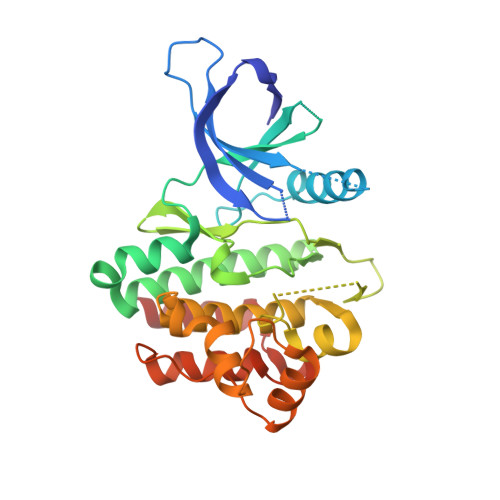Tricyclic Covalent Inhibitors Selectively Target Jak3 through an Active Site Thiol.
Goedken, E.R., Argiriadi, M.A., Banach, D.L., Fiamengo, B.A., Foley, S.E., Frank, K.E., George, J.S., Harris, C.M., Hobson, A.D., Ihle, D.C., Marcotte, D., Merta, P.J., Michalak, M.E., Murdock, S.E., Tomlinson, M.J., Voss, J.W.(2015) J Biological Chem 290: 4573-4589
- PubMed: 25552479
- DOI: https://doi.org/10.1074/jbc.M114.595181
- Primary Citation of Related Structures:
4QPS - PubMed Abstract:
The action of Janus kinases (JAKs) is required for multiple cytokine signaling pathways, and as such, JAK inhibitors hold promise for treatment of autoimmune disorders, including rheumatoid arthritis, inflammatory bowel disease, and psoriasis. However, due to high similarity in the active sites of the four members (Jak1, Jak2, Jak3, and Tyk2), developing selective inhibitors within this family is challenging. We have designed and characterized substituted, tricyclic Jak3 inhibitors that selectively avoid inhibition of the other JAKs. This is accomplished through a covalent interaction between an inhibitor containing a terminal electrophile and an active site cysteine (Cys-909). We found that these ATP competitive compounds are irreversible inhibitors of Jak3 enzyme activity in vitro. They possess high selectivity against other kinases and can potently (IC50 < 100 nm) inhibit Jak3 activity in cell-based assays. These results suggest irreversible inhibitors of this class may be useful selective agents, both as tools to probe Jak3 biology and potentially as therapies for autoimmune diseases.
- From the AbbVie Bioresearch Center, Worcester, Massachusetts 01605. Electronic address: eric.goedken@abbvie.com.
Organizational Affiliation:

















